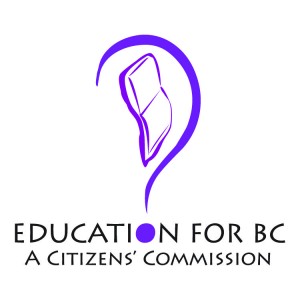Posts Tagged ‘education’
With Labour Peace And A Four-Year Horizon
The results may be unofficial, but they are in.
My congratulations to Carolyn Broady, Dave Stevenson, Nicole Brown, Sheelah Donahue, and Pieter Dorsman: the newly elected West Vancouver Board of Education.
With a new mandate of four years and with the campaign behind them, this group of Trustees can now focus on the key priority which is to ensure that our public education system in West Vancouver continues to be one of the best, not only in British Columbia but across Canada.
We are so fortunate in West Vancouver. Not to deny that we too have vulnerable populations and significant needs here, but we are an economically affluent community and one which benefits from the support offered by parents, residents, and businesses. As I’ve often said, it’s not a surprise that we have a graduation rate of 99% in West Vancouver; anything less would be a scandal.
As a school district, we also have an accomplished team of leaders and educators working on behalf of our students and our community — a team recognized for their innovative practices as well as their commitment to excellence. Their efforts are matched by the hard work and diligence of all the district’s employees.
And yet I’m apprehensive.
Because there are pressures on the public education system from which even West Vancouver will not be immune.
The most significant pressure which this Board will face, as with all Boards across the province, is the issue of funding. While West Vancouver has been able to develop other sources of revenue, whether via academies, specialized programs, or international student enrolment, the amount raised may keep annual deficits at bay, but it does not fix the structural deficit upon which our system is based. There are cracks in the foundation.
There’s also a question in my mind as to what the provincial government’s intent may be with regard to both the governance structure and the bargaining structure. I’m worried about consultations which may appear to be based on consensus and which in fact are not.
With the election of a new Board and with one more public Board meeting to attend, I will be entering a new phase. I will now be a former Trustee, but that won’t make me any less committed to the cause of public education, whether in West Vancouver or throughout British Columbia. I will continue to play a part as an interested observer and passionate parent-advocate. To find out more about my plans, please check out EducationForBC.com and the information posted there.
With regard to School District 45, my top three issues for the new Board, in addition to continued advocacy at the provincial level, are: (1) to build and enhance relationships within the district; (2) to ensure the continued prominence of the arts and humanities in all our schools while exploring and expanding new opportunities for students; and, (3) to work towards smaller class sizes as well as enhanced support for students including advanced learners, children with special needs, and English Language Learners.
With a longer mandate and labour contracts in effect until 2019, there’s time and stability within the public education system for this Board to do its very best.
I’m counting on them as are all the members of our community, all our education partner groups, and, most importantly, all our students.
My appreciation to all the candidates who so generously and graciously put their names forward for consideration and my congratulations again to each of the newly elected and re-elected Trustees. Thank you in advance for your diligence, your hard work, and your passionate commitment to public education in West Vancouver.
An Announcement in Two Parts – Part 2: Let The Talks Begin
I want to talk to everyone.
I want to talk to parents, students, teachers, administrators, Trustees, business leaders, politicians, school district employees, community residents, the media, and more.
I want to talk to people in the Lower Mainland, throughout British Columbia, across Canada, and internationally. And I want to share the content of these discussions with others.
I want these conversations to be about education. Specifically, I want to discuss and investigate the following three key questions:
- What is education?
- What is the purpose of education?
- How do we deliver this education to all the children of BC to ensure the future health and vibrancy of our society?
I also want to make sure that education is a ballot box issue in 2017. I want the moderator of the next leaders’ debate to pose more than one throwaway question on the topic and I want every MLA candidate in this province to be asked about education when they are campaigning.
Why?

Because the current polarization in the education sector is not productive. The discussions about education in this province have devolved into ideologically formed positions and institutional battles with the result that we are not serving our children well.
The last Royal Commission on Education was held in 1988 and the world has changed since then, but these changes are not reflected enough within our education system.
During the recent job action, the BC Education Plan, a framework for planning proposed under the direction of the Ministry of Education, was politicized and the partisanship compromised the plan as an avenue for wide-ranging conversations.
I appreciate efforts such as BCEdChat on Twitter (Sunday evenings at 7:00 p.m. @bcedchat), the Ministry-led discussions around the curriculum, and many other individual initiatives meant to raise awareness of education issues. I also recognize the hard work of many other groups which have recently emerged to support public education. I hope they’ll all continue with the important work they’re doing. The more voices raised, the more they’re likely to be heard.
I also respect the work of the established groups which represent a collective voice for parents (BC Confederation of Parent Advisory Councils, BCCPAC), educators (BC Teachers’ Federation, BCTF), trustees (BC School Trustees Association, BCSTA), and others. Each organization has their own issues to address and I think they all have much to do in the future to meet the needs of their members.
Even so, it seems to me that we need to draw on a much wider circle of participation.
And that’s what I plan to do.
I want to create a forum and an arena where everyone can contribute to the discussion without having to be a member of any particular organization or having to espouse a particular outlook or perspective.
I want this to be a dialogue for all of us because the way in which we manage education affects each of us.
With this in mind, I’ve established a citizen’s commission on education. It’s a small step. One I felt I had to take because the “bigger picture” discussion about education has been lost in the turbulence of the sector over the past few decades.
This idea may work. It may not work. But I felt I had to do something to galvanize public attention and to give education in this province the attention and support it requires.
It’s time to focus the dialogue on education: what we mean by that term and what we want it to be. Then we need to let our political representatives know what it is we want from our education system. We can no longer sit back and have them tell us what education should look like because based on the evidence, their views do not seem to extend beyond the next election.
Join me in the conversation. Help me create a framework for dialogue. Visit www.EducationForBC.com and follow @edu4bc on Twitter. Help me get the talking started.
Let’s work together. Let’s make this happen for our children and for all of us.
An Announcement in Two Parts – Part 1: Not This Time
Three years ago, I put my name forward as a candidate in the 2011 municipal elections. I ran for the position of Trustee on the West Vancouver Board of Education and was honoured when voters in this community elected me to serve in that capacity.
My foray into electioneering also marked my social media debut outside the comfort zone of Facebook.
I dove into Twitter, a platform with which I’ve become very comfortable and which is now a part of how I absorb, consume, and contribute to media on a daily basis. It has also allowed me to create an invaluable network of connections.
After a long time of saying, “I would like to start a blog,” the election also spurred me to start one which I called The Comfort of Why. The best explanation for this title can be found in the speech I made at the first all-candidates’ meeting in 2011 where I said:
I take great comfort in the question why. As long as I’m asking why, I’m thinking, I’m reflecting, I’m challenging. I am looking for answers rather than assuming I have all the answers. I’m seeking information rather than dictating the way that things ought to be perceived.
To me, this questioning is not about undermining a system and disregarding the work that’s been done. It’s about validating what you believe, being responsive and strategic — making changes when they’re needed, when they’re necessary, and making them at the right time.
My first blog entry was posted on October 19, 2011, and it was comprised almost entirely of questions including this one:
Consider, too, that the BC Ministry of Education is pushing the concept of “personalized learning in the 21st century”. Why? What does it mean?
My position at the time, in regard to this particular question, was as follows:
Well, I want to be at the table to make sure that if there’s an overhaul of the system it’s done well and it’s done right. That it’s implemented in a way which benefits all students.
After three years of being at the table, I still feel this is a valid question and one that is not being addressed at a provincial level.
I still want to have this conversation. In fact, I feel we must have this conversation if we are to continue to offer our children the best opportunities to learn, to grow, and to find their way in the world.
While I recognize the valuable work that our Board has done in the past three years, in collaboration with the District Leadership Team, our education partners, our educators, and all our employees, I will not be seeking reelection in 2014.
Why?
There are a number of factors, but let me focus on three key points.
First, West Vancouver is a community with such depth of talent and with many actively engaged residents who are passionate about education. The deadline for nominations is tomorrow and already seven candidates have filed their papers which means we will have a dynamic and substantive campaign featuring a diverse range of opinions from individuals who all have much to offer.
Second, the most recent job action was very instructive and there are many lessons to be learned in how it played out. One of the most significant learning outcomes for me was to recognize that in order to move the provincial government into action on education, we need much greater direct engagement from the public. That citizens’ voice has to be galvanized if we want to ensure that education is a prominent, if not THE, election issue in 2017.
Finally, education in British Columbia has become such a polarized — and polarizing issue — that what we don’t talk about is education. This discussion — the conversation I’ve always said I wanted to see happen — has been drowned out by criticisms and accusations, by duelling press conferences and media soundbites, by job actions and political posturing.
It’s time that we, as citizens and voters, speak up and get what we want for our children, our society, and our future.
I have some ideas on how we might do just that.
Watch for Part 2.
Reflecting on the Post-Appeal Landscape
This is not an article about denying any person or organization the right to due legal process.
Why do I feel it necessary to start off with such a sentence?
Because I’m familiar with the way in which posted opinion pieces are picked apart in the frenzied hot-house atmosphere of social media and what I’m about to say will likely be open to simplistic misinterpretation.
Before I explain and as I’ve done in previous articles, I’d like to note that any errors of fact in the following discussion are my own as are the views expressed here: these are not the views of the West Vancouver Board of Education. I’d also like to clearly acknowledge that this is not a legal opinion.
Starting in 10 days’ time, the BC government and the BC Teachers’ Federation (BCTF) will once again be in court, this time at the BC Court of Appeal addressing the government’s appeal and stay which were both granted in response to the Griffin decision released earlier this year.
The case hinges on what Justice Griffin deemed to be the unconstitutional removal of clauses from the collective agreement relating to class size, class composition, and the ratio of specialist teachers.
I’m not going to dwell on the intricacies of labour law, on the history of the case, or on the relative merits of each sides’ arguments.
What I want to touch on is what may happen after the appeal.
Why?
Because it’s time to get public education in BC out of the courts and back into the classrooms and I’m concerned about the post-Appeal landscape in terms of the potential for continuing legal proceedings.
An article by Ian Mulgrew of The Vancouver Sun prompted me to reflect and write on this issue. In his piece, Mr. Mulgrew explains a recent Supreme Court decision which declared that the fees BC charges for court hearings are unconstitutional. The court ruled that these fees in effect prevented individuals from unfettered access to the legal system in their pursuit of justice.
So what’s the connection to the pending appeal of the Griffin decision?
To me, it’s this. We know the Supreme Court of Canada is the highest court in the land and we know it remains as the ultimate arbiter especially in regard to Charter issues. Applying to the Supreme Court of Canada with regard to a judgement ought not to be taken lightly and only with due regard to the consequences its decisions may have on governance and policy.
There has been much speculation that no matter who wins the appeal this October, the next step is bound to be the Supreme Court because the issues raised in the Griffin decision go to the very heart of collective bargaining rights.
But does it automatically follow that it is the right course of action in this situation?
Specifically, if the government loses the appeal would it be smarter to honour the spirit of the Griffin judgement and negotiate class size and composition rather than taking the matter to the Supreme Court of Canada and risking an outcome which could have a significant impact on all public sector agreements?
Similarly, if the government wins the appeal would it be smarter for the BCTF to honour the spirit of the Griffin judgment and negotiate class size and composition rather than taking the matter to the Supreme Court of Canada and risking an outcome which may actually relieve the government of an obligation to significantly reinvest in the BC public education system?
I know that lawyers for both sides will have very compelling reasons for their clients to continue to pursue the case all the way to Ottawa. Why not? It’s a legal challenge and becomes part of one’s legal legacy let alone precedence as law of the land.
However, is it valid to say just because you can doesn’t mean you have to? And while the outcome of the case on court hearing fees is a victory for citizens, I think the case regarding the BCTF collective agreement is even more complex and nuanced which makes the risk, in my opinion, greater.
And while I’m proud of our legal system and would always support due process, I’m not convinced — yet — that extending this particular legal imbroglio all the way to the highest court will be in the best interest of our students.
What Is The Purpose of Education?
It was a very interesting day to hear Susan Lambert speak.
It was the day teachers throughout British Columbia were voting on whether or not to ratify a new collective agreement, one which fell short of expectations and which merely represented the achievable at this moment in time.
While it was a difficult deal for educators to accept, one of the most important achievements for the BC Teacher’s Federation (BCTF) in the new agreement was the preservation of the integrity of their court case on class size and composition.
And Susan Lambert, who had other reasons for looking askance at the proposed agreement, knows how critically important that court case is for the future of public education in BC.
For those who may not know, Susan Lambert is the past president of the BCTF and a long time educator having started her teaching career in 1973/1974. She is also an alumna of the Faculty of Education at Simon Fraser University (SFU).
And that’s how I happened to be in the audience to hear her speak. She was addressing an education class at SFU, a class in which my nephew is enrolled.
Yes, I have a nephew who is currently pursuing an undergraduate degree at SFU and whose long-term plan is to become an educator.
I not only support his choice, I celebrate it because no matter the hardship and the challenge, being a teacher, in my view, remains one of the most fundamentally important roles in society.
My nephew’s professor had invited Ms. Lambert to address his students and had told them guests were welcome. When my nephew extended the invitation, I jumped at it: this was not an opportunity I was going to miss.
Why?
Because while I may not agree with Ms. Lambert on any number of issues, she is a passionate advocate for public education. Not only that, but she is a firm believer in making the world a better place, particularly for those who are most disadvantaged in our economic system.
She is also someone worth listening to because of her experience in BC’s public education system and because of her commitment to advocacy.
At the beginning of her presentation, Ms. Lambert challenged the students to consider what their purpose was in becoming educators. In other words, she wanted them to consider why it was they wanted to teach. She asked them to consider the question because, as with any vocation or endeavour which we undertake, it is the meaning in what we do and the intent with which we do it that makes our choices purposeful and rewarding in good times and in bad.
I think this is particularly true in a profession such as teaching which is based on relationships and where doing one’s best is instrumental in helping others to achieve theirs.
As much as I appreciated Ms. Lambert’s challenge to the students, it was her summary of the purpose of education which crystallized why the fight for public education in British Columbia is so critical.
And it is simply this: a thriving and vibrant public education system is the essential ingredient for a civil society.
A just society.
An equitable society.
What greater purpose could there be but to work on behalf of a system which is the foundation to a better future for all citizens and not only those who can afford it?



